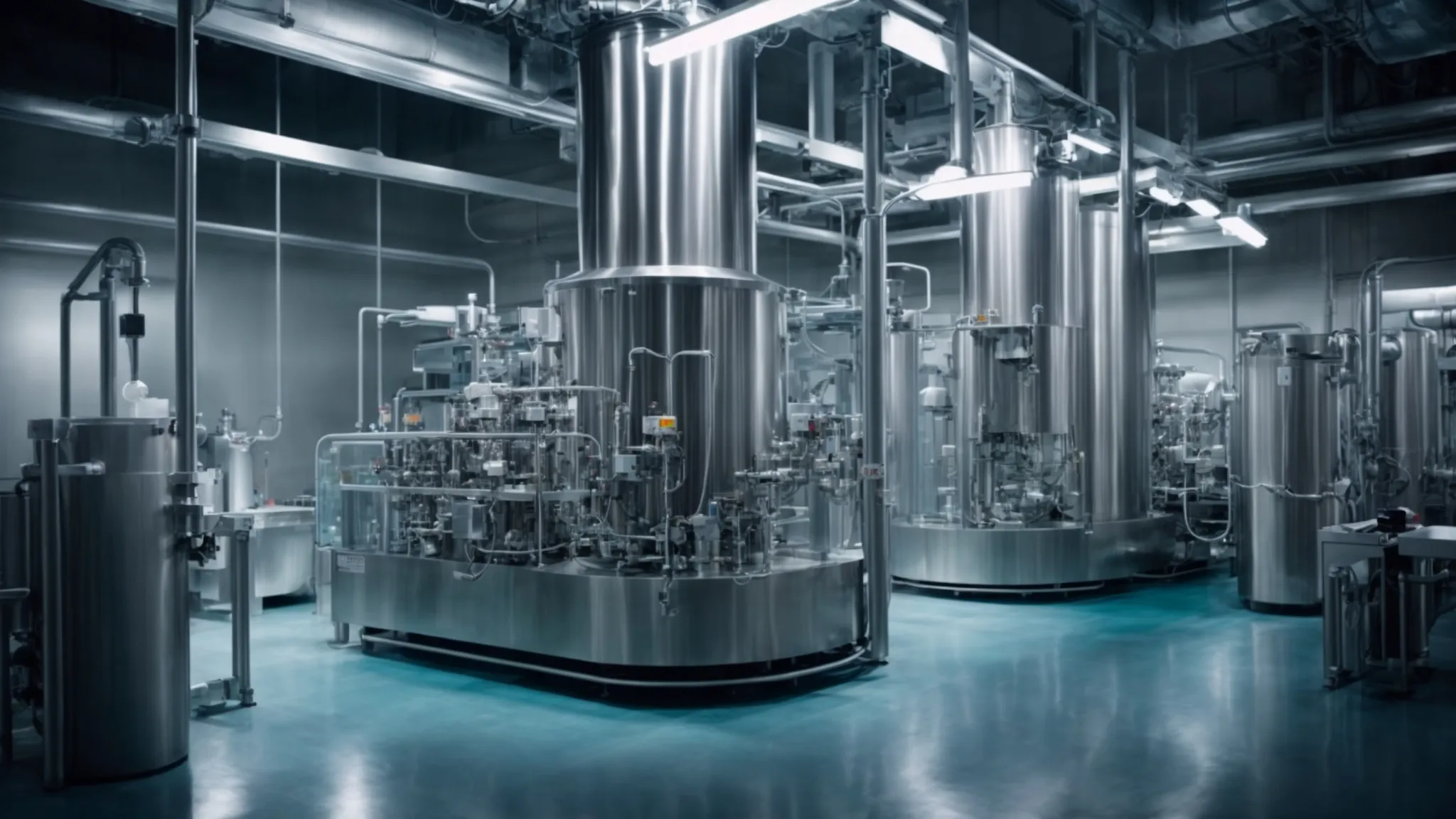Precision fermentation is a process where microorganisms like yeast and bacteria are used to produce proteins. This method contrasts with traditional methods of protein production, offering a more efficient and sustainable approach. By harnessing the natural abilities of microorganisms, scientists can produce proteins that are essential for nutrition and health without the need for animal farming.
Defining Precision Fermentation in the Modern Era
Precision fermentation combines technology with traditional fermentation processes, allowing for the production of proteins with high precision and purity. This method bypasses the inefficiencies of traditional protein sources, offering a more controlled and consistent production environment.
| Traditional Method |
Precision Fermentation |
| Protein from animal farming |
Protein from microorganisms |
| High resource consumption (water, land) |
Resource-efficient production |
| Greater greenhouse gas emissions |
Lower carbon footprint |
| Variable quality and purity |
Consistent and controlled quality |
| Dependent on livestock health |
Not affected by diseases like avian influenza |
The Role of Microorganisms in Producing Proteins
Microorganisms like bacteria and yeast are central to precision fermentation. These microscopic entities convert simple substrates like sugar into complex proteins through metabolic processes. This technology enables the production of proteins that mimic those found in nature, without the environmental and ethical costs associated with traditional animal-derived proteins.
How Precision Fermentation Differs From Traditional Methods
Precision fermentation differs significantly from traditional protein production methods. It uses controlled bioreactors instead of open fields, is not dependent on animal farming, and is highly scalable. This method also has a lower environmental impact, making it a more sustainable option for protein production.
The Science Behind Precision Fermentation-Derived Proteins
The biochemical processes involved in precision fermentation are intricate and fascinating. Microorganisms are engineered to convert substrates into valuable proteins, using specific enzymes to catalyze these reactions. This method ensures high protein purity and uniformity, essential for meeting nutritional standards.
Key Enzymes and Microorganisms Used in Precision Fermentation
Different microorganisms and enzymes play crucial roles in precision fermentation. For instance, yeast strains like Komagataella and specific enzymes like chymosin are used to produce proteins such as whey and casein. These components are engineered to optimize production efficiency and protein quality.
Turning Genes Into Gourmet: The Genetic Engineering Aspect
Genetic engineering is vital in precision fermentation. By editing the genetic code of microorganisms, scientists can tailor them to produce specific proteins. This innovation allows for the creation of proteins that meet consumer expectations in taste, texture, and nutrition, redefining the food industry.
Benefits of Precision Fermentation-Derived Proteins
Precision fermentation-derived proteins offer numerous benefits, including nutritional advantages over conventional protein sources. These proteins are designed to be more digestible and often surpass traditional proteins in quality. They also have a lower environmental impact, contributing to sustainability and food security.
Nutritional Advantages Over Conventional Protein Sources
These engineered proteins are highly digestible and free from antibiotics and growth hormones. They are intentionally enriched with essential amino acids, providing a complete nutritional profile that promotes overall well-being.
Environmental Impact and Sustainability
Precision fermentation significantly reduces greenhouse gas emissions compared to traditional agriculture. It also conserves water and preserves biodiversity, offering a more sustainable approach to protein production.
Scalability and Food Security Implications
Precision fermentation’s scalability ensures a steady and reliable protein supply, essential for global food security. This technology can adapt to changing market demands and population growth, providing a resilient food system.
Challenges in Scaling Up Precision Fermentation
While promising, precision fermentation faces challenges in scaling up production. These include technical and biological limitations, economic factors, and regulatory hurdles. Overcoming these challenges is crucial for widespread adoption.
Technical and Biological Limitations
Optimizing bioreactor designs and downstream processing is essential for large-scale production. Maintaining the health and productivity of microorganisms at scale is also a significant challenge.
Economic Factors and Industry Adoption
High initial costs for research and development, along with capital investment for infrastructure, are economic hurdles. Demonstrating clear economic benefits to the broader food industry is key to adoption.
Regulatory Hurdles and Public Perception
Navigating regulatory frameworks and gaining public acceptance are critical for scaling precision fermentation. Educating consumers about the benefits and safety of these proteins is essential for widespread adoption.
Applications of Precision Fermentation-Derived Proteins
These proteins have diverse applications, from alternative dairy and meat products to biomedical and nutraceutical uses. They also have potential in innovative areas like biodegradable materials and cosmetics.
Alternative Dairy and Meat Products
Precision fermentation enables the creation of dairy and meat alternatives that replicate the taste and texture of traditional products while being more sustainable and ethical.
Biomedical and Nutraceutical Uses
These proteins are used in medical treatments and supplements, offering potential for personalized healthcare solutions.
Beyond Food: Other Innovative Applications
Precision fermentation-derived proteins can also be used to create sustainable materials and cosmetics, offering new solutions to environmental and health challenges.
The Future of Food: Precision Fermentation’s Role
Precision fermentation is poised to play a crucial role in the future of food production. Trends indicate a shift towards sustainable proteins, with potential for personalized nutrition solutions.
Trends and Predictions in Protein Production
The demand for precision fermentation-derived proteins is expected to grow, driven by advances in biotechnology and increasing consumer awareness of sustainability.
The Potential for Personalized Nutrition Solutions
This technology can create tailor-made proteins to meet individual dietary needs, revolutionizing the field of nutrition.
Navigating the Transition Towards Sustainable Proteins
The transition to sustainable proteins requires overcoming challenges in consumer acceptance, regulatory alignment, and market adaptability.
From Lab to Table: The Journey of Precision Fermented Proteins
The journey from research and development to commercialization involves overcoming manufacturing challenges and gaining consumer acceptance. This process is essential for bringing precision fermentation-derived proteins to market.
The Research and Development Process
Scientists engineer microorganisms to produce specific proteins, a meticulous process requiring constant innovation and adaptation.
Manufacturing and Production Challenges
Scaling up production involves optimizing bioreactors and ensuring consistent protein quality. Downstream processing is also crucial for purifying proteins for human consumption.
The Path to Commercialization and Consumer Acceptance
Educating consumers and building trust are essential for commercializing precision fermentation-derived proteins. Transparency and effective marketing strategies play a crucial role in this process.
Consumer Attitudes Towards Precision Fermentation-Derived Proteins
Understanding and addressing consumer concerns is vital for market adoption. Educational strategies and effective branding can promote acceptance and trust in these innovative proteins.
Collaborations and Innovations Driving Precision Fermentation
Partnerships among industry leaders, academia, and governments are driving the field forward. These collaborations are essential for advancing technology and integrating it into mainstream food production.
Key Players and Startups in the Field
LEC Partners
is at the forefront of precision fermentation, creating proteins that replicate traditional dairy and meat products.
Partnerships Between Academia, Industry, and Governments
Collaborations among academic institutions, industries, and governments are crucial for advancing precision fermentation and ensuring regulatory compliance.
Grants, Funding, and the Role of Venture Capital
Venture capital and grants play a vital role in supporting the research and development of precision fermentation technologies, enabling startups to scale up production.
Staying Informed: The Importance of Ongoing Research
Ongoing research is essential for advancing precision fermentation. Staying informed through conferences, journals, and scientific communities helps drive innovation and collaboration in the field.
Current Research Projects and Breakthroughs
Recent breakthroughs in microbial growth systems and bioreactor technology are optimizing protein production for scalability and cost-effectiveness.
Conferences, Journals, and Scientific Communities
Conferences and scholarly journals are vital for sharing research and fostering collaboration among professionals in the field.
The Need for Multi-Disciplinary Collaboration
Collaboration among biologists, engineers, nutritionists, ethicists, and policymakers is essential for advancing precision fermentation and ensuring it meets public interest and sustainability goals.
Partner with LEC for Precision Fermentation Success
At LEC Partners, we are dedicated to helping businesses of all sizes achieve sustainable and successful outcomes. Whether you’re a startup or a multinational company, our community of world-renowned bioeconomy experts has the experience and expertise to guide you to success.
Why Choose LEC Partners?
- Unmatched Bioeconomy Expertise: As trusted leaders in the bioeconomy, we deliver sustainable and profitable results, guiding projects from planning to execution.
- Customized Teams: Your project is unique, and so is our approach. We assemble a custom team to meet your specific needs, whether you require one expert or many.
- Streamlined Communication: No matter the size of your project team, you will always have a single point of contact for seamless coordination and communication.
- Comprehensive Services: Beyond engineering, operational, and financial guidance, we offer additional services like regulatory support and expert witness testimony, to ensure you are covered from every angle.
Ready to Transform Your Precision Fermentation Business?
Take the next step and partner with us to shape the future of Precision Fermentation. Contact us today to learn how our community of over 180 bioeconomy experts can help you achieve your goals.


